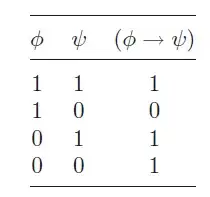You write (in response to a comment):
so I should be interpreting the mathematical "implication" as the definition resulting from the above truth table without trying to link it to the everyday meaning of the word implication?
I wouldn't quite go that far, but I would say that you shouldn't try too hard to make it match the natural-language behavior of implication. Rather, you should ultimately convince yourself that the truth table above is the best way to approximate natural-language implication as it is used in mathematics with a classical (= true or false) truth functional (that is, the truth value of an implication should depend only on the truth values of the hypothesis and conclusion).
To help motivate my claim above, let me give a concrete example of a situation where we definitely want a false statement to imply something:
If $104723$ divides $918273643635\times 85943204812$, then either $104723$ divides $918273643635$ or $104723$ divides $85943204812$ (or both).
The crucial fact here is that $104723$ is prime, and this means that for any $a, b$, if $104723$ divides $a\cdot b$ then it divides either $a$ or $b$ (or both). So we can say confidently that the statement above is true, without digging into those bigger numbers' details.
But in fact we can check - with work (or a computer) - that $104723$ does not divide $918273643635\cdot 85943204812$. So the hypothesis of the statement is false. At this point we're forced to conclude one of two things:
We were wrong above when we claimed that this implication held; and in particular, we can't use theorems like "If a prime divides the product of two numbers, it divides one of the numbers (or both)" in the natural way.
Or, having a false hypothesis doesn't make an implication false.
The latter is adopted for classical logic, simply because it better matches actual mathematical reasoning. You can argue that the former is better suited to natural language, and we have various nonclassical logics which try to address that, but it's important to recognize the value of being able to mathematically prove that an implication is true without showing that the hypothesis is true.
EDIT: Let me end by saying a couple words about a few other ways to approach implication.
First off, we could cook up a logic where $p\implies q$ is false whenever $p$ is false. As far as I know, this isn't done anywhere, but there's no real barrier - I just don't know that anyone's found it interesting enough to pursue (I think because "$p\implies p$" is something we pretty much all agree should be true, regardless of $p$).
However, we could try to draw a distinction between certain "vacuous" (= false-hypothesis) implications: some (like my example above, or "$1<2\implies 3<4$") have a kind of logic to them, while others (like that of your title) are just ... "silly." We could demand that a vacuous implication be true only if the hypothesis is somehow "relevant" to the conclusion. In fact, once we go down this road there's no need to pay attention only to vacuous implications: something like "If $2+2=4$, then Fermat's last theorem is true" is also fishy! This leads to relevance logic (and related concepts).
Another tack we could take is to think about contingency. For example, consider the sentence "If it were raining right now, the ground outside would be wet." This is something we probably agree is true, but - at least where I am, currently - the hypothesis is false. We can resolve the situation while remaining skeptical of vacuous implications by noticing that "it is raining right now" is false but not absurd. One way of expressing this is to say that there is a possible world where it is true; there are other approaches, but I like this one at least at first. Considerations like these will ultimately lead to modal logic.
And there are others, but hopefully the above helps at first. Incidentally, if you want to dive straight into the deep end you might check out the magnifigargantuamazing book The connectives. It's $1512$ pages long - that's not a typo - and hardback, so probably not a good idea to read without close-toed shoes (you may find this review entertaining).
